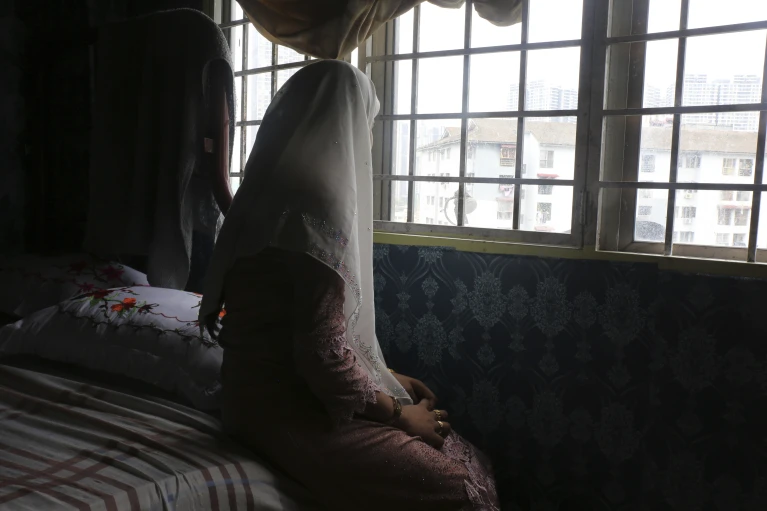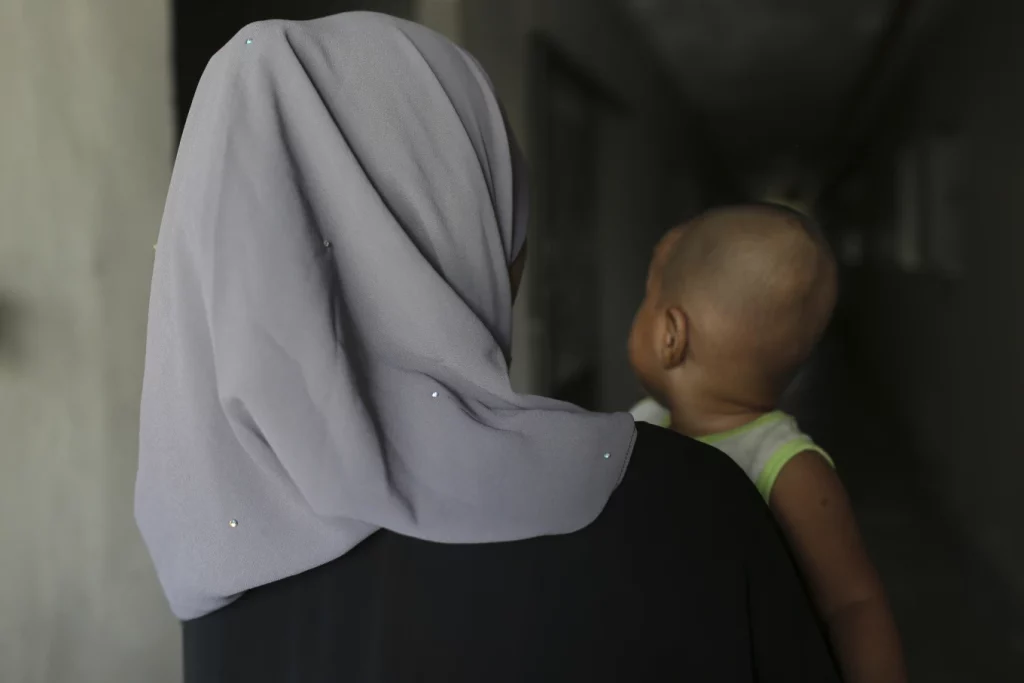In the heart of Kuala Lumpur, Malaysia, a harrowing narrative unfolds in the life of a 14-year-old Rohingya girl, identified here as M. Trapped in a bedroom turned prison, she faces the nightmarish reality of being raped by her 35-year-old husband almost every night. Her journey, initiated to save her impoverished family from the clutches of Myanmar’s military, has become a haunting tale of exploitation and despair.
The Silent Suffering: A Systematic Exploitation
A Desperate Exodus
Last year, M embarked on a perilous journey, leaving behind her homeland for an unfamiliar country, agreeing to marry a stranger. It was a decision not of her choosing but born out of desperation. Myanmar’s military assaults in 2017 left her family impoverished, hungry, and living in constant fear.
Trapped in Darkness
Now in Kuala Lumpur, M finds herself confined in a bare room, the walls telling a tale of neglect. A knotted rope dangles from the ceiling, a cruel reminder of the forced motherhood her husband imposes. Her plea to return home echoes through a small voice, barely audible, revealing a sense of entrapment that pervades her existence.
Unveiling the Disturbing Trend: Rohingya Girls in Malaysia
The Unseen Atrocity
Deteriorating conditions in Myanmar and Bangladesh’s refugee camps drive scores of underage Rohingya girls to Malaysia for arranged marriages. The Associated Press interviewed 12 young Rohingya brides, all sharing tales of abuse, control, and the haunting consequences of forced matrimony. Shockingly, the youngest victim was a mere 13 years old.

Held Hostage
All the girls interviewed recount stories of captivity, abuse, and restricted freedom. Held hostage by controlling husbands, many endure beatings and rape, both during their journey to Malaysia and within the confines of their new lives. Alarmingly, half of these young brides find themselves pregnant, despite their unpreparedness for motherhood.
The Nexus of Apathy: Global Indifference and Stricter Policies
Escaping the Unending Tragedy
The Rohingya crisis, marked by violence, systematic rape, and hunger, has left these girls with limited options. With no citizenship or working rights in Bangladesh and a life-threatening return to Myanmar, fleeing to Malaysia becomes a desperate attempt at survival.
The Female Exodus
Remarkably, the demographic of fleeing Rohingya has shifted, with over 60% being women and children. The United Nations’ refugee agency reports a concerning rise in child trafficking and child marriage among Rohingya refugees.
The Dark Realities in Malaysia: Unseen, Unreported
A Hidden Crisis
Malaysia, not a signatory to the UN’s refugee convention, becomes a silent accomplice to the sufferings of these girls. Fearful of reporting assaults to authorities due to potential detention center abuse, the Rohingya girls remain voiceless victims in a foreign land.

The Role of Advocacy
Local advocates, like the Rohingya Women Development Network, witness a surge in arrivals over the past two years. Yet, the absence of safe spaces and the prevalence of domestic violence leave these girls in a perpetual cycle of misery.
The Unthinkable Choices: A Parent’s Dilemma
Desperation Leading to Unthinkable Choices
To comprehend why parents would subject their children to such horrors, one must fathom the desperation from which they emerged. A mother, Hasina Begum, speaks of sending her daughter on a perilous journey, hoping for a better life in Malaysia. The cruel reality unfolds as many boats, laden with dreams, succumb to the merciless sea.
To Be Rohingya Is to Suffer
As the world looks away, these choices become the epitome of suffering for the Rohingya. The apathy of nations and stringent migration policies force these families into unimaginable choices, leading to a never-ending cycle of pain.
Conclusion
In shedding light on the plight of Rohingya child brides in Malaysia, we unveil a crisis that demands urgent attention. The world must recognize the systematic exploitation, rampant abuse, and silent suffering these girls endure. It is our collective responsibility to advocate for change, raise awareness, and stand against the darkness that engulfs the lives of these innocent victims.

